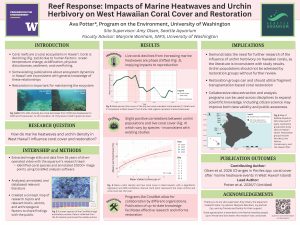Reef Response: Impacts of Marine Heatwaves and Urchin Herbivory on Hawaiian Coral Reef Health and Restoration
Coral reefs provide major ecosystem services and contribute significantly to economies, but global coral cover is decreasing. There is little definitive research on factors of coral changes in West Hawai‘i, despite it being a hotspot for biodiversity, fishing, and tourism. Several restoration projects have been initiated, but lack region-specific data. The purpose of this study was to review existing diver-operated video (DOV) to determine the impacts of abiotic and biotic factors such as marine heatwaves and urchin herbivory on corals in West Hawai‘i, and to review their influence on restoration efforts in the region. To accomplish this, I extracted images from 16 years of DOV and annotated 37,000+ data points to identify corals. I learned RStudio analysis software, contributed as an author on a scientific article, and conducted literature reviews of relevant sources to assess restoration impacts. Findings showed that live coral cover declines were phase shifted post-heatwave, implying impacts to reproduction rather than growth. Thus, transplant-based restoration may be effective even with marine heatwaves. There were slight species-variable positive correlations between urchin density and coral cover. I also found that inter-organization collaboration is crucial for restoration, the methods of which are heavily based on published literature. My study results are inconsistent with existing relevant literature, which states that urchins have distinctly negative effects on coral cover. To effectively inform restoration and policy, my research will be peer-reviewed and published. This work demonstrates the need for more research on West Hawai‘i ecosystem dynamics to ensure ecological information is up-to-date.
